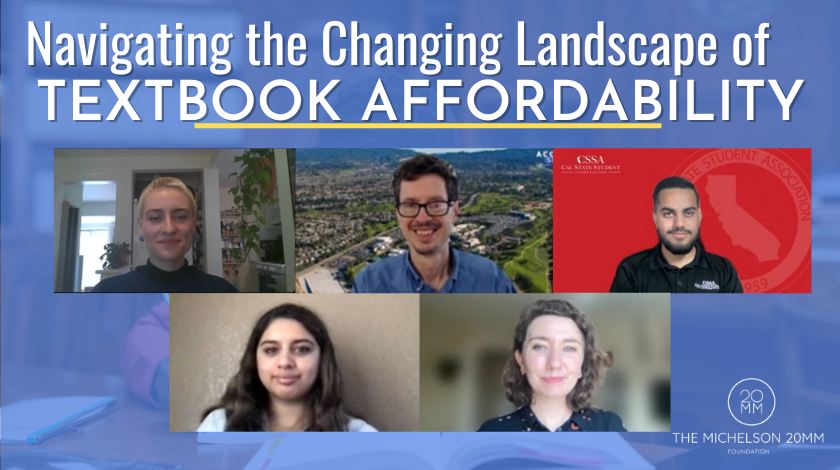News and Announcements
Celebrating Open Education Week: California Has Been a Leader, Yet More Work Remains
Published Date
- March 18, 2022

By Cailyn Nagle
For the past decade, Open Education Week has been a global celebration of the potential of the education commons and the educators, librarians, advocates, and students who make it possible and the advances we’ve seen in adoption. The weeklong international event, originally created by Open Education Global, has expanded to include student organizing, educational panels, and opportunities for collaboration. From the recent historic investment in Zero Textbook Cost degrees to individual campus’ achievements, over the past year California has a lot to celebrate when it comes to strides in open education—yet a lot of work remains to be done.
“Navigating the Changing Landscape of Textbook Affordability” leaned into the spirit of celebrating the wins and buckling down for the work with a panel of student leadership and issue area experts sharing their experiences and perspective. With the goal of educating policymakers, community college trustees, and community members, the March 10th event focused on affordability, accessibility, and the role of student data. Panelists included:
- James Galapa-Grossklag, Dean of Technology, College of the Canyons; OER Fellow, Michelson 20MM
- Trudi Radtke, OER Program Manager, Scholarly Publishing and Academic Resources Coalition (SPARC)
- Krishan Malhotra, Vice President of Legislative Affairs, California State University Student Association
- Jasmine Prasad, Vice President of Legislative Affairs, California Community Colleges Student Senate
- Cailyn Nagle, OER Program Manager, Michelson 20MM
During the event, panelists discussed the root causes of the broken textbook marketplace, the role paywalled digitizing course materials have played in inaccessibility, and the significant potential that OER provides for students and educators. Jasmine Prasad and Krishan Malhotra shared the changing reality of what students are expected to purchase for their classes and the barriers that expensive digital materials can create. James Glapa-Grossklag shared how the first round of Zero Textbook Cost degrees in 2016 saved students eight times its original investment, while improving student success rates across the board. Meanwhile, Trudi Radtke discussed serious concerns regarding student data privacy in education technology but also shared how open educational resources allow students to better see themselves in their course materials.
Key takeaways include:
- Textbooks remain a cost barrier to students. This has not been helped by the rapidly digitizing course material landscape that has limited the traditional ways students have cut costs, such as sharing books or buying used materials.
- In addition to textbooks, many students are required to pay for platforms to complete required tasks including homework.
- OER are materials written under an open copyright license, which makes them free to use and share. While this cuts costs, it has also added benefits of more educator control over materials and improved student success rates.
- California is a leader in supporting open educational resources, particularly with the recent budgetary support for the California Community College’s Zero Textbook Cost Degree programs. While the state has made huge strides, there is still work to do to make sure every student can access their necessary course materials.
If you would like to revisit the conversation, a full recording is available on our YouTube Channel. If you would like to discuss textbook affordability in California, please reach out to Cailyn Nagle, OER Program Manager, at cailyn@20mm.org.
Michelson 20MM is a private, nonprofit foundation seeking to accelerate progress towards a more just world through grantmaking, operating programs, and impact investing. Co-chaired and funded by Alya and Gary Michelson, Michelson 20MM is part of the Michelson Philanthropies network of foundations.
To sign up for our newsletter, click here.